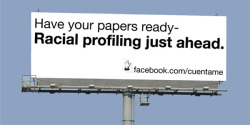Federal judge hears arguments for Class Action Status in Suit against Arizona Juan Crow Law
 Plaintiffs are seeking class status for three separate groups:
Plaintiffs are seeking class status for three separate groups:
1. Anyone who is or could be subject to being stopped, detained, arrested or questioned about their immigration status based on their race or national origin.
2.Anyone who is or could be deterred from soliciting work in a public place or from performing work.
3. Anyone who is or could be deterred from living, associating, worshiping or traveling with immigrants in Arizona.
SB 1070 makes it a state crime to be in the country illegally and requires an officer engaged in a lawful stop, detention or arrest to, when practicable, ask about a person’s legal status when reasonable suspicion exists that the person is in the U.S. illegally. Police may also stop anyone who they believe looks like they are "illegal" - based on skin color or language.
From [HERE] While the federal government’s legal challenge to Senate Bill 1070 immigration law [PDF] sits in the hands of the U.S. Supreme Court, a separate federal lawsuit alleging the law could violate individuals’ rights is creeping forward.
U.S. District Court Judge Susan Bolton heard arguments Monday over whether to grant the case class-action status, which could allow hundreds of thousands to join what has been named the Friendly House case, after one of the plaintiffs. Plaintiffs include immigrants, immigrant-rights groups, religious groups and non-profit organizations.
The federal government’s case — and the looming Supreme Court ruling — focuses on state vs. federal authority, while this case alleges SB 1070 could violate individuals’ Fifth Amendment right to due process, First Amendment right to free speech and 14th Amendment right to equal protection.
A judge last week ruled that several Arizona residents have legal standing to challenge the law after the plaintiffs argued that enforcement of the law would increase the possibility that they would be the target of discrimination by police officers due to their appearance or lack of English proficiency.
“A lot of focus has been placed on the federal government’s lawsuit, but our case focuses on the civil-rights violations that SB 1070 will cause,” said attorney Chris Newman with the National Day Laborer Organizing Network.
Class-action status would allow plaintiffs to join or extricate themselves from the case as their situation warrants, said attorney Karen Tumlin with the National Immigration Law Center. For example, if the Supreme Court ruled that key parts of the law should go into effect, individuals who felt their rights were violated when they were detained or arrested under the law could later join this lawsuit instead of filing a separate lawsuit of their own.
“It promotes efficiency and reduces the threat of repeat litigation,” Tumlin said. “It is unclear what will continue to happen after the Supreme Court rules, but (class-action) certification will assure this is the case that moves forward.”
 Attorney Bob Henry with Snell and Wilmer, who is representing Gov. Jan Brewer in defending SB 1070, argued against granting class-action status. He questioned the need for it and said this case challenges the text of SB 1070 on its face and not any real situations of civil-rights violations under the law. Parts of the law have gone into effect, but the most controversial parts have not.
Attorney Bob Henry with Snell and Wilmer, who is representing Gov. Jan Brewer in defending SB 1070, argued against granting class-action status. He questioned the need for it and said this case challenges the text of SB 1070 on its face and not any real situations of civil-rights violations under the law. Parts of the law have gone into effect, but the most controversial parts have not.
He alleged the plaintiffs are seeking class-action status based on speculation that the law could go into effect and could lead to racial profiling. He described the motion as “riddled with ambiguity.”
“Class certification is simply unnecessary,” Henry argued. “This entire statute will be implemented consistently with folks’ civil rights.”
Joe Sciarrotta, general counsel for Brewer, called the request “legally unsound and procedurally unnecessary.”
“This request is a distraction from dealing with the true issue of SB 1070′s constitutionality,” he said.
Attorneys for the plaintiffs are seeking class status for three separate groups:
Anyone who is or could be subject to being stopped, detained, arrested or questioned about their immigration status based on their race or national origin.
Anyone who is or could be deterred from soliciting work in a public place or from performing work.
Anyone who is or could be deterred from living, associating, worshiping or traveling with immigrants in Arizona.
Bolton took the request under advisement and will issue her ruling at a future date. She said a ruling will not come before the end of this month. She gave little indication during the hearing how she may rule, although she did ask the attorneys to explain why class-action status was needed.
Bolton said that when the courts rule a law is unconstitutional, the ruling doesn’t apply only to the plaintiffs in the lawsuit, but to everyone.
“What do we gain by having several classes certified that gives the case more weight?” she asked.